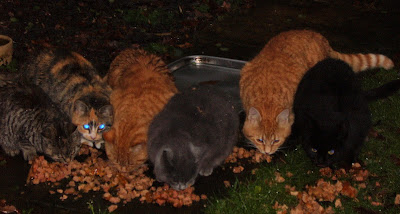Written in response to recent discussions on the Quilt Art list. Some of this I learned at the Warburg Institute (University of London); the rest I made up myself. To be taken with a big pinch of salt!In the beginning there were things that needed to be made and makers who made them. Most things that were made had uses: tools, containers, clothes, bedcoverings and so on. Some had extra powers: images of animals that helped you catch food more easily, patterns that descibed journeys or gave you magical protection or told people who you were. People had begun to make art but they did not know it then for the word had not been invented. In any case, everyone did it so it was no big deal and there was no need to make up a special word for it.
Communities over time grew and became more complicated and instead of all doing the same things, people began to specialise in different things. Some tilled, some spun, some fished, some fought off raids from other groups or in turn raided other groups; some sat and watched. They made up a special word for this and called it civilisation.
In this civilisation there were some people who managed to live well without actually doing very much at all, but were good at making people believe that they were right to live like this because they alone understood what everyone else should be doing. They did not need to be makers anymore because other people made things for them. But because they themselves were special the things that were made had to be special too, and they invented a special word - art - to describe them, and they called the people who made them artists.
Soon great competition developed between these civilised groups to be biggest and best, and there was competition about art and artists too - you know the sort of thing: "My artist's got a bigger paintbrush than your artist", "my artist knows how to mix up two thousand shades of green", "my artist painted a whole ceiling with cherubs that look like they're actually peeing on you" and so on. And the people who didn't make art themselves but Knew What They Liked made up titles for themselves, and called themselves Patrons Of The Arts and Arbiters Of Good Taste. And the Arists, who by this time had acquired a capital letter, learnt that if they made their Patrons feel bigger and more important they got extra helpings at dinner, and flattery was born. And making things that flattered became far more important than making things that had uses.
In the meantime, some of the makers had also learnt that you could make things that didn't have uses, and they became artists. Though they didn't have capital letters they tried to become more like the Artists that did, in the hope that when they grew up they would get capital letters too.
When they discovered that there weren't enough capital letters to go round, some artists decided they would do something different and made up the word original to describe what they did. They were told that they were not Real Artists, only starving artists and as a punishment they were forced to live in draughty garrets with pot-bellied stoves that did not work very well so that they died of consumption and afterwards became Great Artists.
And the civilisations grew and grew and there were uppings and downings and massive topsy-turveyings all over the place. Suddenly capital letters were being lost and passed on and confiscated and begged and borrowed and stolen and nobody knew whose they were any longer and all sorts of confusions resulted. And out of the confusions came new and strange creatures - Gallery Owners, Critics, Collectors, Professors of Art; some of them were arists themselves but many were not but they were Rich and Respected and Had Taste and Knew What They Liked so they were able to explain to the artists what they should be doing. They saw all the artists and divided them into groups - Good Artists, bad artists, amateur artists, Real Artists, New Wave Artists, folk artists, commercial artists, craftspeople, would-be-artists and so on.
And in the end no-one knew who they were any more and many became uncertain whether they were allowed to call themselves artists at all.
And then someone asked the questions What is Art? and What is an Artist? and no-one knew the answer. So the only thing to do was laugh.







